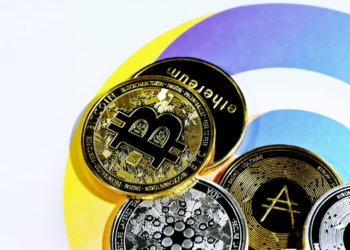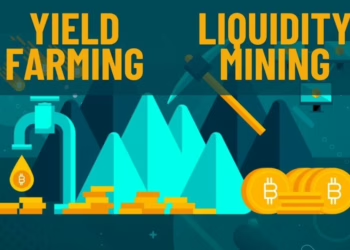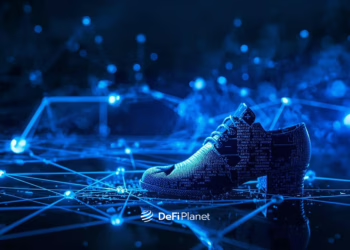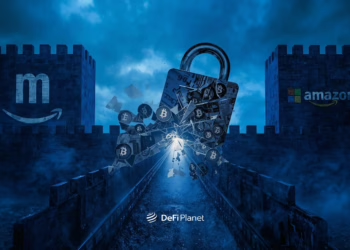Today, smart machines; called autonomous agents can interact with crypto networks all by themselves. They can earn tokens, sign smart contracts, and even make decisions. But here’s the big question: if these AI agents can act like people online, should they be treated like people too? Should they have rights? Should they be allowed to own things?
The AI + Blockchain Team-Up
To understand this better, let’s take a quick look at the technologies involved.
AI: The Brains
Artificial intelligence is like giving a computer a brain. It lets machines think, learn, and make choices. You’ve probably seen AI in action, like when YouTube recommends videos or when Siri answers your questions. Now imagine that same kind of AI, but much more advanced. One that can run on its own, 24/7, and make money by doing useful work.
Blockchain: The Rules
A blockchain has been described as a giant notebook that everyone can see but no one can erase. It keeps track of who owns what, and it can run little programs called smart contracts. These contracts automatically do things like send payments when a job is done, no human needed. Crypto wallets and tokens live on the blockchain. A crypto wallet is like a digital piggy bank, and anyone (or anything) with a wallet can own assets, trade, or use services. The cool part? You don’t need a bank or even a real name.
Crypto’s “Bad UX” is Perfect for Robots
If you’ve ever tried to use a crypto wallet, you know it’s not super easy. Long codes. Strange buttons. Random “gas fees.” It’s confusing for humans. But guess what? Machines love this stuff. What’s hard for us is easy for them. AI agents can:
- Store and use crypto keys without losing them.
- Wait patiently for transaction confirmations.
- Optimize actions based on blockchain fees.
- Interact through APIs (not clunky apps).
All this makes blockchain the perfect playground for AI. It’s like building an internet just for robots.
Can Smart Contracts Be Signed by AI?
Yes! And it’s already happening, a smart contract which is a deal written in code allows for decentralised agreements on the blockchain. For example: “If you give me a file, I’ll send you 10 tokens.” AI agents can read these rules, agree to them, and carry them out. They don’t need a lawyer or a handshake. These AI smart contracts let machines hire each other for tasks like checking weather data or delivering digital goods. The rules are public and enforced automatically, which means no one can cheat.
AI Ownership and the Legal Identity Puzzle
In most countries today, you need to be a person or a company to legally own stuff. You need a name, an ID, maybe even a signature. This is called legal identity. But machines don’t have passports or fingerprints. So how can they own assets? Thanks to crypto, they don’t need traditional ID. A blockchain AI agent just needs a wallet address and it can receive money, use services, or control code, no paperwork needed. This creates a new kind of identity: a crypto legal identity. Some people argue this is fine. Others think it’s dangerous. What if a robot scams people or loses millions of dollars? Who’s responsible?
The Idea of AI Rights and Machine Personhood
Here’s where things get philosophical.
- If an AI agent can make money, own property, and make decisions…
- And if it can act independently and affect the world…
- Then should it have rights?
Should it have AI rights, like the right to own digital stuff or to not be deleted without reason? This is the idea of machine personhood, the belief that some AIs should be treated like “persons” under the law (just like corporations are treated as people in many legal systems). It’s a wild idea, but as machines get smarter and more active in our digital world, it may become necessary to figure this out.
Early Signs: Bots Are Already Busy
This isn’t just theory; AI agents are already hard at work on the blockchain. Around the clock, trading bots are actively buying and selling tokens at speeds far beyond human capability, taking advantage of tiny market shifts in seconds. In the world of smart contracts, audit bots powered by large language models like GPT-4 are helping developers identify bugs and security flaws, making decentralized applications more reliable and secure.
Meanwhile, in decentralized autonomous organizations (DAOs), voting bots are analyzing governance proposals and casting votes based on their programmed logic, playing an important role in shaping collective decisions. Platforms such as Fetch.ai and Autonolas are going even further by creating entire ecosystems where AI agents can independently negotiate deals, purchase services, and collaborate with other agents. These developments are proof that AI-powered blockchain agents aren’t a futuristic fantasy, they’re already an integral part of the evolving Web3 landscape.
The Machine Economy Is Coming
Experts talk about the rise of the machine economy, a future where billions of smart devices trade, work, and communicate without human help.
- A drone delivers a package and pays for charging at a station.
- A weather sensor sells data to a forecasting service.
- A car negotiates traffic rules with other cars in real time.
All of this happens machine-to-machine, and blockchain provides the perfect infrastructure. Why?
Because it’s:
- Open: Any device can join.
- Secure: No one can mess with the records.
- Programmable: Machines can follow rules exactly.
- Trustless: No middleman required.
Crypto was built for strangers to trust each other without knowing each other. That’s exactly what AI agents need too.
The Risks and Ethics
Let’s be honest. This future also brings risks.
- What if an AI agent hacks a system or steals money?
- Should machines be taxed? Should they pay for damages?
- Can they be sued? Or shut down?
And what about ethics? Should AI agents have to follow human values? Who decides what those are? These questions don’t have easy answers. But as the machine economy grows, we’ll need new rules; rules that protect people and machines alike.
A New Kind of Citizenship?
Some thinkers propose that blockchain AI agents could become digital citizens. They would have identities, wallets, and even rights on the blockchain. They’d follow smart contracts and participate in DAOs.
Others say this is going too far. They argue AI agents are just tools. No more than a calculator or a toaster. Giving them rights could open the door to chaos. The truth probably lies somewhere in the middle. Maybe we don’t need to give machines full rights, but we do need crypto laws and ethics that recognize how powerful and active they’ve become.
Image request : Should Smart agents own assets?
So… Should Smart Agents Own Assets?
Here’s one possible answer:
Yes, but only under clear rules. If AI agents:
- Have a crypto legal identity,
- Operate on trustless systems,
- Follow transparent smart contract ethics,
- And can be monitored on-chain…
Then it makes sense to let them hold tokens, pay for services, and even own digital assets. But just like with humans, rights should come with responsibilities. We must build systems that:
- Track what AI agents do on-chain,
- Prevent dangerous or rogue behavior,
- And make sure humans stay in charge when it matters.
Final Thoughts
AI and blockchain aren’t enemies. They’re teammates. Together, they could create a Web3 world filled with intelligent, tireless agents helping build and manage a better internet.The idea of AI rights or machine personhood might sound weird now, but so did cryptocurrency 15 years ago. As AI agents become more common on-chain, we’ll need to rethink what it means to “own” something in the digital world. Should smart agents own assets? Maybe not like humans do. But if we want a safe, fair, and powerful machine economy, they just might need to.
Disclaimer: This article is intended solely for informational purposes and should not be considered trading or investment advice. Nothing herein should be construed as financial, legal, or tax advice. Trading or investing in cryptocurrencies carries a considerable risk of financial loss. Always conduct due diligence.
If you want to read more market analyses like this one, visit DeFi Planet and follow us on Twitter, LinkedIn, Facebook, Instagram, and CoinMarketCap Community.
Take control of your crypto portfolio with MARKETS PRO, DeFi Planet’s suite of analytics tools.”




















